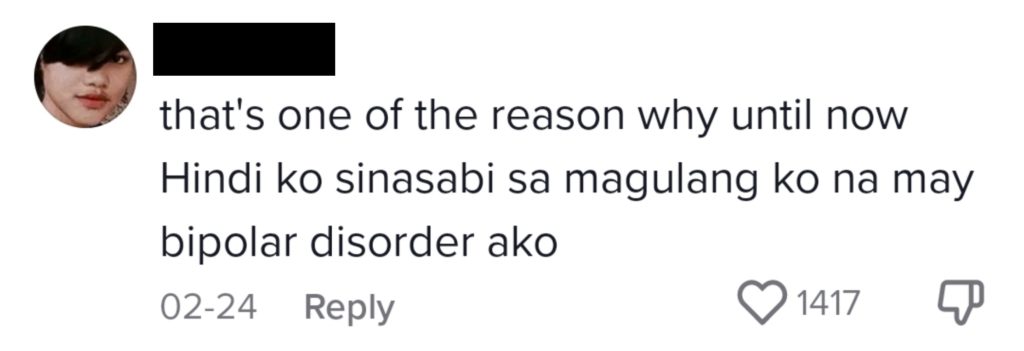Picture this: you’re struggling with a mental health illness and after keeping your battles to yourself, you gather all the courage to tell someone about what’s going on. You decide to talk to your parents first, hoping that they’ll listen and support you.
However, you’re only met with a response that stings you, saying that it’s all just in your head and you shouldn’t think of it.
In a culture that considers mental health taboo, this scenario is among the many painful situations most people with mental health illnesses encounter. Sadly, this is also common in many Filipino households.
Case in point, a recent TikTok clip has made its rounds on the internet after one user shared their family’s response when they found out their sister was diagnosed with anxiety disorder.
https://www.tiktok.com/@renzu_dan/video/7202824146898668827?_r=1&_t=8aMlC4457z7
In the video uploaded by user @renzuzu, the family can be seen talking in a group chat about the user’s sister being diagnosed with a mental health illness. Their responses, however, were heartbreaking.
One member commented, “Normal [laboratory] test. Anxiety disorder daw (It’s just a normal laboratory test, not anxiety disorder),” while the other said, “Wag ka kasi masyado mag-isip (You shouldn’t think too much about it).”
Another one even commented to not play mobile games too much and to sleep after coming home from work instead.
The video, which garnered over 1.7 million views as of this writing, has caught the attention of many Filipinos on the video streaming platform, with many users sharing similar stories and experiences.

The viral video uploaded by @renzuzu and the stories of other TikTok users revealed a sad and hard pill to swallow: most Filipino parents are still not ready to address and talk about mental health issues, and it shows.
In our culture, family is everything, and that’s why a lot of Filipinos always remind each other that in times of hardship, your family will be the first people to support and help you.
But why is it that when it comes to mental health issues, our family will be the first one to invalidate our situations and discount our feelings when we decide to open up to them about our struggles? They are even the first to dismiss our problems and tell us to just “pray” them away and not to think about them too much. It seems like they deny our emotional and mental struggles and view them as pag-iinarte instead when in fact it’s more than just that.
But then again, in hindsight, I (sort of) understand why most Filipino parents failed to grasp how serious mental health issues are and why the stigmatization of mental health in the Philippines is still prevalent now. This stemmed from the traditional beliefs and mindsets that have been practiced and passed from generation to generation.
Our parents grew up in a different time with different beliefs and for them, some things are considered taboo, and talking about mental health struggles is one of them.
Our religious beliefs also didn’t help as most people from the older generations claim that if we just pray harder and have more faith, our problems will go away and we will no longer struggle.
Then there’s our tendency to romanticize resiliency. In Filipino culture, we put too much emphasis on being resilient at all times amidst our personal sufferings. We’re known as the “smiling-through-the-pain” kind of people, as I’d like to call it.
As a result, most of us think that opening up and talking about our feelings and problems are signs of weakness. We usually hear this from the older generations when they will tell us, “Ang hina naman ng loob mo,” and then proceed to share how their life before was much more difficult than what we’re facing right now.
This kind of thinking only contributes to the growing stigma attached to mental health. I will probably get backlash from just writing this, but this is the sad reality of the mental health status in the Philippines. Despite the passage of the Republic Act no. 11036, known as the Philippine Mental Health Law, mental health issues are still considered taboo.
And this is the reason why, more than ever, we’re pushing and working harder to raise awareness of mental health and the issues surrounding it.
As individuals, there’s so much we can do already such as educating the people around us, engaging in informational discourses, and joining organizations that advocate for mental health awareness.
But of course, our individual efforts aren’t enough to beat the stigma surrounding mental health. Let’s continue to call on the attention of our community, and local and national governments to strengthen the implementation of mental health policies and make mental health resources easily available and accessible.
It’s already 2023, and it’s time to stop treating mental health as an afterthought.
Other POP! stories that you might like:
‘Trauma Dumping’: Why people resort to social media to share their mental health struggles
5 easy ways beginners can start practicing mindfulness
Zachary Knowles’ new music is a personal story on overcoming his mental health battles
Want better mental health this year? Start by doing this one *little* thing